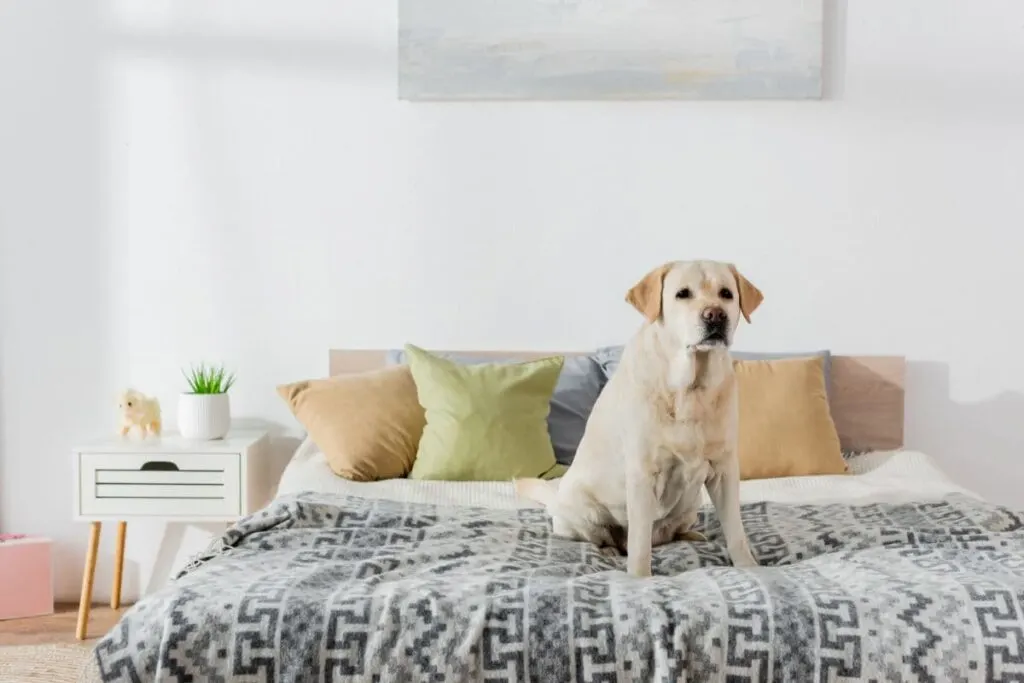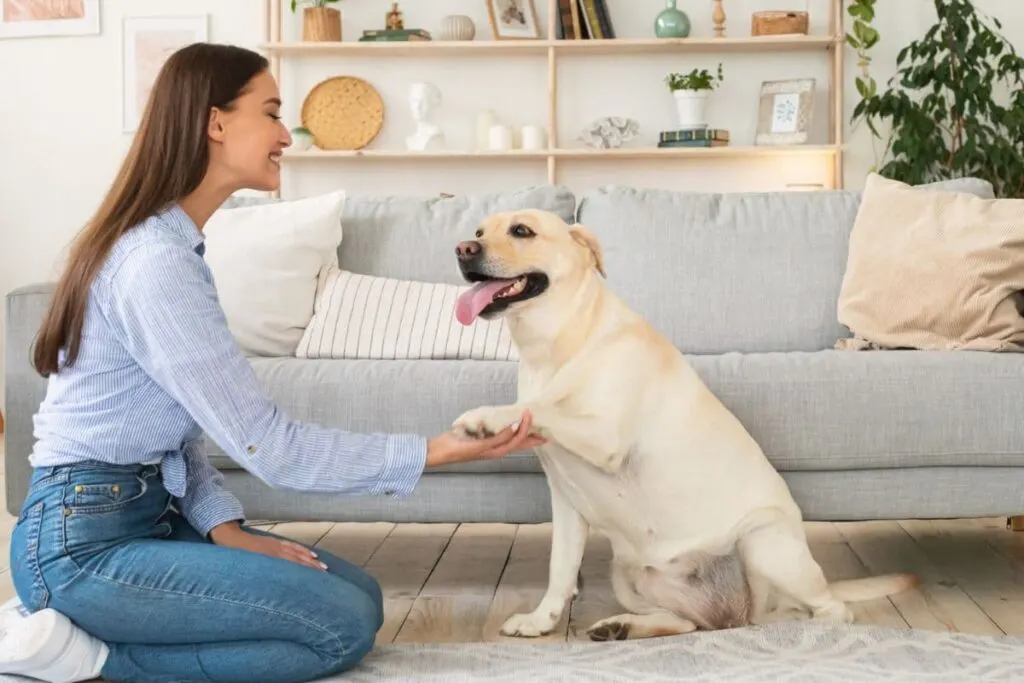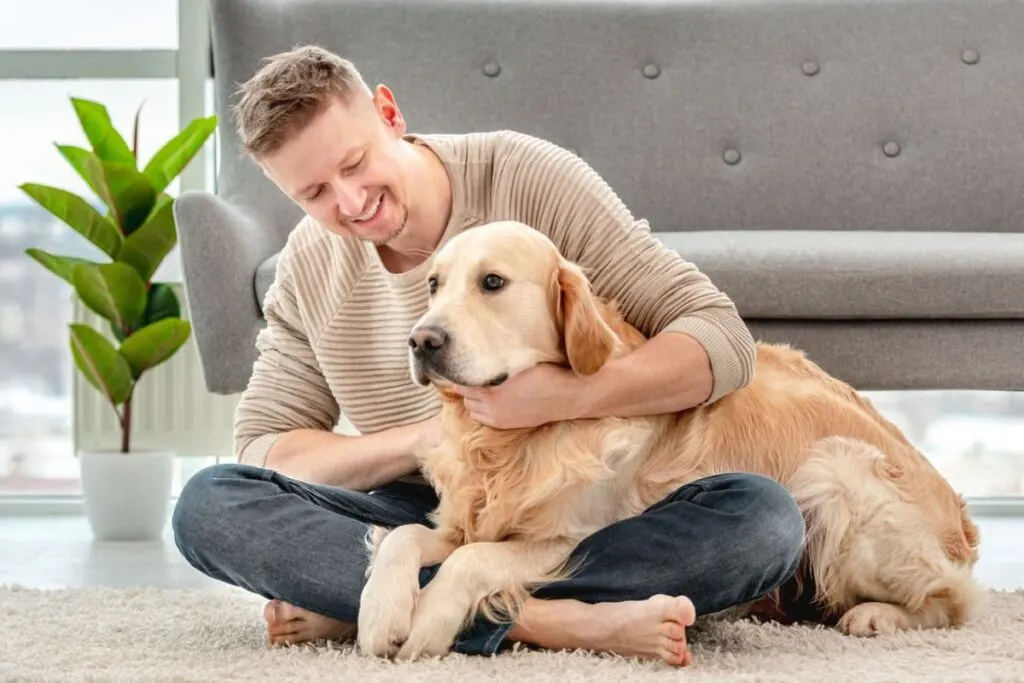If you’re the type of pet parent that loves sleeping with your dog in your room, it can be upsetting when it no longer seems interested in spending some quality nap time with you.
So why does your dog no longer want to sleep in your room?
Your dog might choose not to sleep in your bedroom because of an external factor, such as a loud noise from your TV or a smell in your room that your dog finds unpleasant.
Factors like extreme temperature, limited space, insomnia, and mobility issues can also contribute to the issue.
In this article, I’ll explore common reasons why your dog is choosing not to sleep in your bedroom anymore.
Later in the article, I’ll also provide tips on how to encourage your dog to start sleeping in your room at night.

12 Reasons Why Your Dog Isn’t Sleeping in Your Room Anymore
There are various reasons why your dog might choose not to sleep in your room with you anymore, and not all of them are serious or a cause for concern.
Although you might worry that your dog is upset with you or doesn’t love you anymore, this isn’t the case!
Here are the most common reasons why your dog isn’t sleeping in your room anymore.
Your Dog’s Being Put Off By Something in the Room
If your dog has suddenly stopped wanting to sleep in your bedroom at night, it’s worth checking if you’ve started doing something different lately, specifically when it comes to smells and sounds.
Dogs have a powerful sense of smell, as they can smell around 10,000-100,000 times better than humans!
So, check that you haven’t started spraying a scent to help you sleep that could be unpleasant for your dog or that you haven’t cleaned your bedroom with strong-smelling products, as the smell could be hanging around in the air and upsetting your dog.
Dogs dislike a variety of scents, with some of the most common ones being:
- Spice
- Citrus
- Mothballs
- Bleach
- Vinegar
You should also think about any noises that could be upsetting your dog. Are you listening to music that’s quite loud, or do you snore a lot at night?
Noises from outside your bedroom can also be a contributing factor to your dog`s disinterest in sleeping over.
Not only are dogs sensitive to loud sounds, but some are especially sensitive to them and will display symptoms such as shakiness when they hear loud sounds.
Your Bedroom Is Too Hot for Your Dog
If it’s summer and your room is very hot at night, this could be off-putting for your dog, who will want to seek out a cooler area of the home.
Check where your dog is relaxing and sleeping, as this could let you know if your dog is moving to a cooler spot in the home.
Indoors, your temperature shouldn’t be lower than 50°F (10°C) or higher than 85°F (29.5°C).
Other ways to keep the temperature cool and make your bedroom comfortable at night include:
- Using thin sheets on the bed.
- Using an air conditioner or a fan.

Your Dog Doesn’t Like Your New Partner
If your new partner is sleeping in the same room as you, the change in your dog’s sleeping preferences could cause it to want to sleep somewhere else.
Other people who are spending time at your house at night could also be disturbing your dog’s bedtime patterns.
Most dogs will be a little anxious when meeting new people, and it can take them some time to get used to new people around them.
This especially happens to dogs who have been abused in the past or who haven’t been socialized to feel comfortable around new people.
Letting your partner build a relationship with your dog should encourage it to feel comfortable sleeping in your room again, but it might take some time, so be patient.
Your Dog Needs More Space on the Bed
When your dog was sleeping next to you on the bed, did you usually feel that they were moving around a lot?
If so, they might have been feeling restless because there wasn’t enough space on the bed.
This could have caused your dog to want to find a different spot in the home where they can stretch their legs and feel more comfortable.
As dogs age, they might also want to spend more time on their own.
This is usually nothing to be worried about and simply comes down to dogs wanting more of their own space at night when they sleep.
You should also consider if you move around too much on the bed during sleep. If you toss and turn, this will disturb your sleeping dog, who naturally wants to move elsewhere.
Your Dog Doesn’t Want To Go to Sleep
If your dog seems to move out of your bedroom and go somewhere else when you’re getting ready for bed, the issue could be that your dog doesn’t want to go to sleep.
This could be the case if your dog sleeps a lot during the day.
At night, when you’re tired and want to go to sleep, your dog might feel active and energetic. Maybe your dog wants to run around the house, or he thinks it’s playtime!
To prevent this issue, it’s vital to give your dog enough exercise during the day so that you change its sleeping habits.
This will also effectively reduce anxiety in your dog, which is another reason why your dog could stay up at night.
Your Dog Is Being Lured Elsewhere
You might be guilty of behaviors that are causing your dog to be interested in exploring other rooms of the house.
Maybe you’ve given your dog treats at night in a different part of the house, and this is encouraging it to go there.

Or, perhaps, you’ve set up a new cozy chair in the lounge, and your dog sees it as the perfect spot to have a long snooze.
Your Dog Has Mobility Issues
If your dog is a senior, he could be suffering from mobility issues like arthritis, which can make it difficult for it to climb up onto the bed.
Check if your dog jumps on other surfaces, such as tables, to gauge if it is only struggling to get onto the bed or has underlying mobility issues.
If they’re struggling to jump in general, they could have a problem with their joints.
Or, your dog could be injured, and this is causing it to have issues with getting onto the bed.
Other symptoms of mobility issues in dogs include:
- Limping
- Stiff limbs
- Hesitation when climbing stairs
- Paralysis
Your Dog Is in Competition With Other Pets
If you’ve got other pets in the home and they’ve started sleeping in your bedroom at night, this could make your dog feel that they don’t have their own space anymore.
For example, if you have a cat that’s started sleeping on your bed, your dog might not be too comfortable sharing the space with the cat, especially if they’re not well socialized.
This could cause your dog to search for a new spot in the house that feels like his/her own and where he can feel comfortable.
Sometimes dogs can feel jealous of other pets in the house, or they might compete with them for resources and affection.
Your Dog Is Trying To Protect the House
Your dog’s natural instinct is to defend the house, so he might be feeling like he has to spend time elsewhere in the house to be on guard and make sure it’s protected.
Perhaps your dog likes to sleep in the lounge because this gives it the advantage of keeping an eye on the garden from the windows.
Or, he might feel like he has to sleep in an area where he can protect all members of the household, and he can’t do this when sleeping in your room.

Your Dog Wants Free Reign
When your dog sleeps in your bedroom, make sure that it has all the things it needs to be comfortable, such as:
- Food (depending on feeding schedule)
- Water
- Litter box
If your dog doesn’t have these essential items in the bedroom for the night, it will want to get them elsewhere in the home.
Your dog might even start to view the bedroom negatively because it’s a space in which it doesn’t get the things it wants or needs.
Your Dog Has a Health Condition
If your dog has a health condition, this could cause it to want to spend more time alone. There are numerous health issues that cause this isolating behavior, such as:
- Heart problems
- Hormone imbalances
- Kidney disease
- Depression
- Anxiety
- Allergies
When it comes to allergies, if something in your bedroom is triggering your dog to have an allergy flare-up, this can make it feel sick and want to avoid your room.
Things that can trigger allergies in dogs include:
- Pollen
- Mold
- Cigarette smoke
- Chemicals
- Feathers
- Dust
Your Dog Wants To Sleep on a Hard Surface
If your dog used to sleep on your bed but has moved away, the issue could be that your bed is too plush, and it’s simply not comfortable for your dog anymore, especially as he’s started to get older.

If your dog is suffering from a health condition, such as heart disease, this could also cause it to want to sleep on a harder surface that offers it more support.
How To Encourage Your Dog To Sleep With You Again
Although it’s never a good idea to force your dog to sleep in your bedroom because they might feel much more relaxed in a different room of the house, there are ways to encourage it to view your bedroom as a sleep sanctuary at night.
Here are some methods you can try.
- Make your bedroom quieter. Avoid anything noisy in your room that could be upsetting your dog. You should make sure that your room is quiet and that there’s nothing making unnecessary noise at night, as this can upset your dog.
- Give your dog exercise. Help your dog burn off energy during the day so that it will be sleepy at night.
- Make your bedroom cozier. Add new blankets and pillows to your bed to make it more comfortable and relaxing. You could also make your bedroom more appealing to your dogs by keeping its snacks and toys in it.
- Get a bed stool. If your dog is struggling to jump onto the bed, purchase a bed stool. I’d recommend a Bamboo 2-Step Stool (available on Amazon.com). It’s stable and has non-slip feet, so it won’t wobble around when your dog jumps on it.
- Make your bedroom cooler. If your bedroom is too hot, install a fan to circulate air into the room and decrease its temperature.
- Purchase a new bed. Although this could be expensive, buying a larger bed or a more supportive mattress will ensure both you and your dog have enough space and are comfortable when sleeping.
- Reward your dog when they sleep on your bed. When you see your dog get onto your bed, praise it by petting it or feeding it a tasty snack. This positive reinforcement will make your dog more likely to return to sleeping on your bed.
- Give your dog rewards to lure it to the bedroom. Before your dog settles in for the night in another area of the home, you should lure it to the bedroom with a treat. Once you’re settled for the night, call your dog and reward them with treats.
- Consult with your vet. If you think your dog has a health condition that’s causing it to spend more time alone, you should book an appointment with your vet. Giving your dog the treatment they need to regain its health will make all the difference in its behavior.
I also have an article discussing why your dog stopped going outside after dark. [Why Won’t Your Dog Go Outside in the Dark Anymore?]
You can check it out to find some overlapping reasons why your dog stopped sleeping in your room as well as potential ways to correct this behavior.
Final Thoughts
If your dog used to sleep in your bedroom, but now he’s not doing that anymore, you might wonder why and perhaps even feel rejected.
But there are many good reasons why your dog doesn’t want to sleep in your room, such as the following:
- Your dog is older and wants its own space.
- Your dog doesn’t like how hot your bedroom gets at night.
- Your dog is active at night.
- Your dog is disturbed by sounds and smells in your room.
